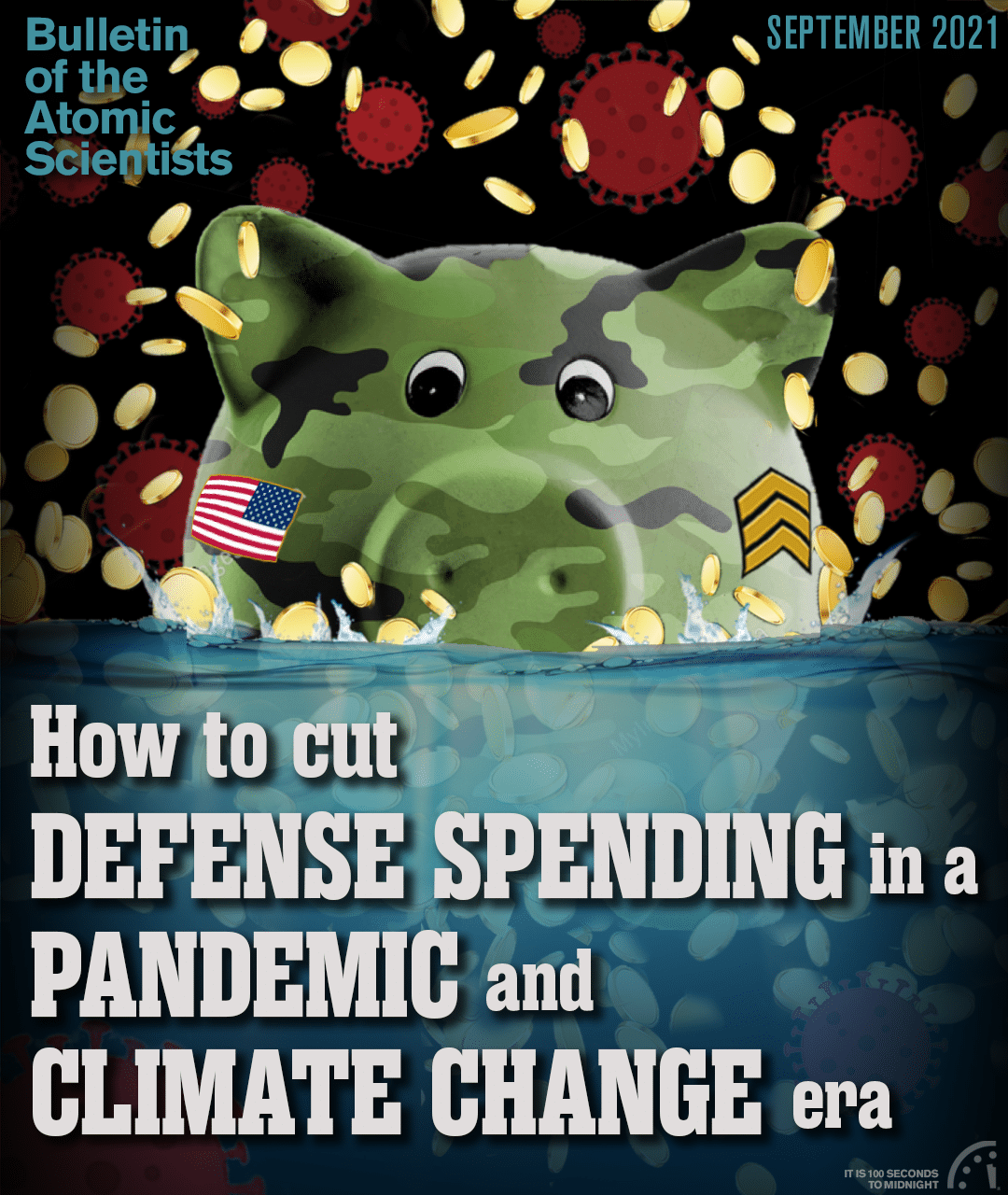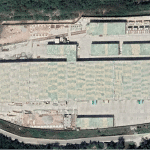Interview: Tom Collina of the Ploughshares Fund on the politics of defense spending
By John Mecklin | September 7, 2021
Interview: Tom Collina of the Ploughshares Fund on the politics of defense spending
By John Mecklin | September 7, 2021
Not long before this interview began, the US Senate’s Armed Services Committee endorsed a defense authorization bill that was $25 billion higher than the Biden administration’s defense proposal—which would, if adopted, bring the total fiscal 2022 budget to $778 billion, a $38 billion increase over the previous, enormous defense spending plan. Tom Collina, director of policy at the Ploughshares Fund, has worked in Washington for decades on nuclear weapons and other defense issues. I asked him about efforts to restrain US defense spending, why they’ve been failing of late, and what must change, if ceaseless (and often mindless) autopilot increases in the US military budget are to be brought under something that resembles rational review.
John Mecklin: I’ve noticed from afar that you and the former secretary of defense have been on a little bit of a campaign to try to get the Ground-Based Strategic Deterrent canceled or delayed, the new ICBM. Why don’t you catch our readers up on where is that what’s happened so far? What’s gone on?
Tom Collina: Well, I’ve been working with former Secretary of Defense Bill Perry to seek the cancellation of the new ICBM and ultimately to retire all ICBM’s, because we see them as dangerous and destabilizing and unnecessary. We were hoping that with the incoming Biden administration, we would have a chance to have that debate, to delay the new ICBM, pending the administration’s Nuclear Posture Review, and possibly extend the life of the existing ICBM and really have a debate about whether we needed a new one.
That is not going very well, in part because the Biden administration came in with a very large defense budget. Essentially, a flat defense budget carried over from the Trump administration, which was already quite large. So there was very little downward pressure on the defense budget that would force the kind of decisions that we were hoping for. We were hoping that in the Pentagon there would be a need to reduce defense spending, which would force decisions and priorities. And it’s still my strong belief that if the Pentagon had to cut some things, one of the first things they would cut is nuclear systems that most military people realize they will not use and cannot be used. And they’d much rather have money for things they do use, like aircraft carriers and planes and tanks and that kind of thing.
But because the Biden administration came in with such a big budget, and because there seems to be little concern about deficit spending, we’re awash in cash. And so the Pentagon can pretty much spend money on whatever it wants. And now we’re seeing that there’s a good chance that the Pentagon will get more money, because the Senate Armed Services Committee just approved another $25 billion for the defense budget. So that’s a long way of saying the efforts are not going well because there simply is no budget pressure that’s forcing tough decisions.

John Mecklin: That brings up sort of a second question. How do you build some kind of constituency for lower defense spending? Because it’s obvious that right now nobody cares. Nobody in either party, the White House, both houses of Congress—nobody has any interest in reducing defense spending. How do you build that constituency?
Tom Collina: It’s kind of amazing, because if you think back to the Obama administration, Obama was concerned about deficits and increased defense spending. And so we had this parity agreement, right, that the defense budget couldn’t raise any faster or any more than domestic spending. And that created a cap that kept things stable for a while. And at that point, politicians still at least claimed to care about things like deficits. But all of that has gone away through the Trump administration. We were assuming that Republicans, once Biden came into power, would rediscover their concern about deficits, and that might create some pressure, as we would need to spend more money on the pandemic, on climate change, on infrastructure, all of these things, civil rights. The need to spend money on new things, a new found concern about deficits, combined, would force some budget discipline on the Pentagon. But that did not happen.
And looking at the recent vote in the Senate—forget the Republicans, only one democratic Senator, Elizabeth Warren, voted against the $25 billion increase for the defense budget. Makes you realize that other than the progressive wing—a small wing, clearly—of the Democratic {arty, there is no concern. And there’s clearly no public concern about overspending on defense. There’s no public concern about deficit spending. Maybe it’s caught up in this spending smorgasbord for legitimate things, like on the pandemic and climate related stuff and infrastructure. But I think once you start spending a trillion here and a trillion there, the public really starts to lose its ability to discern good spending from bad. And so now we just have the flood gates are open. We can spend gobs of money on anything, including defense.
John Mecklin: One of the things I’ve noticed is that the rampant lack of concern about defense spending allows obviously ridiculous programs to go forward. I just wanted to hear your thoughts about how we maybe magnify in the public arena things that are so obviously crazy as a low-yield submarine launched ballistic missile. I mean, if you actually reason that out, it’s crazy.
Tom Collina: There are a lot of crazy things. And I guess I want to maybe focus on a crazy thing that is actually really expensive, as opposed to a crazy thing that is cheap, like the low yield warhead on the subs.[1] I would argue that ICBM’s are really, strategically, a bad idea and they’re going to cost us over $200 billion over their lifetime. So, these are truly expensive systems that we will be better off without. In fact, I’ve argued that we’d be better off putting that money in a barrel and burning it than using it to buy these missiles because of the false-alarm danger, because of putting presidents in a position where they have to decide the fate of the world within 10 minutes or less. It’s simply unsustainable and dangerous, and we’re increasing our own risk of nuclear catastrophe by spending hundreds of billions of our own dollars to make this happen.
And I think part of the reason why we’re doing it anyway is that nuclear weapons are just one more commodity now. They’re big business. And companies are making billions of dollars off nuclear weapons. People’s jobs and careers are supported by nuclear weapons. Politicians have nuclear weapons in their states and districts and want the jobs from those, and nuclear weapons have just become another policy issue, kind of like anything else. And so politicians, even President Biden, whom I like very much and has done some great things, I think sees nuclear policy as just another issue to trade off against his priorities. So one of the reasons why President Biden came in with such a high defense budget is he didn’t want to have that fight, right? He’s got a razor-thin margin in the House and the Senate, and he could have had that fight, but he had other things he wanted to do. And I’m not arguing with his other priorities. I mean, COVID, of course he had to do, getting the relief package for the pandemic, now on to infrastructure and climate and voting rights.
I’m not quibbling with his agenda, but the point being that he has ranked nuclear policy and preventing nuclear war below all those things. And to me, they’re not comparable. I mean, yes, we need to solve the pandemic. Yes, we need to solve climate change. But a nuclear war could ruin the world in an afternoon, and it’s completely preventable. Nuclear weapons are the only thing that could end our civilization in a day.
It’s very difficult to see our way clear to making progress on this unless the public becomes more concerned about overspending in the Pentagon, overspending on nuclear weapons, and makes those issues clear to the president and politicians. Because certainly right now they perceive no political damage in overspending on the Pentagon and on nuclear weapons.
John Mecklin: So that verges into my next question. Obviously right now the climate for reigning in defense spending, particularly in nuclear, is bad. It’s not going to happen in the next year. Next two years? Probably not going to happen. So let’s talk about on the five-year plan, or the 10-year plan. What needs to happen? It’s a really daunting political landscape; every congressman has military spending in his or her district. They get contributions from defense contractors. There is little upside to saying you want to rein in defense spending, and a great downside with usually Republicans beating Democrats with a big stick while saying, “You’re weak on defense.” So give me the Tom Collina five-year, 10-year plan. How do we change that calculus?
Tom Collina: Well, that’s a great question. And if I knew the answer I would probably be doing something else right now. But we can postulate what some parts of the answer might be. Clearly public concern about overspending of our tax money has some valuable attributes, because if spending can just go rampant with no controls whatsoever, then there’s no discipline. We can spend money on anything, as you said, even really undesirable things, even really dangerous things. So I think there needs to be more concern about how tax dollars are being spent on the part of the public.
And then I think the public needs to understand that not only is excessive defense spending expensive and wasteful, but it’s dangerous. And that while we’re spending so much money on the Pentagon and so much money on nuclear weapons, the money isn’t going to reduce risks. In some cases, it’s going to increase risks. And that’s hard for the public to understand—that additional money spent on defense and nuclear weapons is risky. It’s a counterintuitive notion. But there are many counterintuitive notions that the public has gotten behind, even arms control. Nuclear arms control itself is counterintuitive. That we’d be safer if we negotiated reductions in weapons rather than building more. So we need to bring the public along on that.
And I think there’s a particular focus that I think might be resonant if we can make more noise about it, which is the role of big business. There’s a lot of corporate greed and corporate corruption that goes into the whole arms industry cycle, the billions of dollars that have been made by corporations, the huge salaries that are being made by corporate CEOs who are making money, whether it’s good for the nation or not. And the notion of whether the nuclear weapons system is good for security or not is kind of a secondary question. It’s much more about who’s making the money. What states are they making that money in? What powerful politicians are in that state? And can we just keep the contracts going?
Tom Collina: Because when I look at Congress, and I look at the hearings they hold, and I look at the questions they ask—I recently testified before the Senate Armed Services Committee. And you just see that this is kind of a … it’s just a machine that keeps moving. Rarely does a member of Congress ask a true probing question. It’s really all meant to say, “Let’s justify this program in my state. Let’s keep the contract going. Let’s keep the money and the jobs going.” There’s really no sincere questioning of the strategic rationale for these things. So maybe if we can bring some focus on the largest defense contractors like Lockheed Martin, Northrop Grumman or Raytheon, and show their motivations and show how they are playing the system to make huge amounts of money. And the process is not only stealing taxpayer dollars from more important projects, but it’s actually making us less safe.
Tom Collina: I obviously don’t have a perfect answer for you, but we clearly have to change public perceptions, to then change politicians perceptions of benefit and risk to them. If they see no risk to overspending, then they won’t stop doing it. And by risk, I mean risk to their political futures. I would like them to perceive risk to security by buying weapons we don’t need that are dangerous, but I think that’s very difficult for them to do in any political environment.
What we need them to understand is there are risks to their political futures.
John Mecklin: It’s always struck me, how faceless the major defense contractors are. They’re companies, but people run those companies. And I think maybe something that could be valuable is to personalize this a little bit, to say, “Well, who are the people leading these companies that are asking these people in Congress to do their bidding?” That could be interesting.
But the other thing I wanted to ask you about is the last time there was really an anti-nuclear movement that actually affected the government, it seems to me, was in the 1980s. I mean, it really changed things. And it seems to me that one of the things that existed then that doesn’t really exist now is the requisite level of fear. People were afraid of nuclear war then—really actually afraid. Are we doing a bad job of scaring them? Do we need to scare people better?
Tom Collina: That’s a great question. It’s something I’ve thought about myself. So here’s the problem with scaring people: One, it’s hard. People are already scared about a lot of things. They’re just not scared about nuclear weapons. And they really haven’t been that scared about nuclear weapons since the end of the Cold War 30 years ago. And you’re right, that fear was a motivational fear during the Cold War. to end the Cold War and to bring in an era of arms control, which we’ve been enjoying to some degree, even if it hasn’t gone fast or far enough.
It’s hard to scare people about the issue you choose to scare them about if it’s not backed up by facts that they see in the media. It’s easy to scare people about COVID because we see hundreds of thousands of people dying from COVID. It’s harder to scare people about nuclear weapons. And even if you do, even if you succeed in scaring people about nuclear weapons, it’s not clear what direction that will take. Because if we just scare people about nuclear weapons, then some percentage of those people are going to say, “Well, then we need more of them.”
I think it’s real tough to know if you scare people, which way that will push them. And I think the test case is right now with China. I think people are being scared about China in a number of dimensions, whether it be cyber or the economy or now, nuclear. And I haven’t seen any positive aspects of that fearmongering about China yet. And I’m not sure that I will. So, fear is a double-edged sword, and if you wield it, it can come back and get you.
John Mecklin: I guess we could run into a silo-building race. We could all start drilling hundreds of nuclear missile silos out in the deserts, like the Chinese.
Tom Collina: A fascinating thing. You could not imagine China doing a worse thing, from the perspective of trying to convince Congress not to build us ICBM’s, than for China to be building its own ICBM’s. Because as soon as China does that, people say, “Oh, well, it must be a good idea of China’s doing it. So we’ve got to do it, too.”
John Mecklin: Last question. You and I both live in a very practical world. You work for Ploughshares, you try to fix things nuclear, and the Bulletin is roughly parallel in some ways. And so you can’t just stop, even though things look bad right now. So what’s the next tack for you and Plowshares? Are you just coming back next year to say, “Stop the ICBM’s” again?
Tom Collina: No, I don’t think so. I think we have to be much more pragmatic than that and really look honestly at the challenges that we face. Ploughshares is going to be stepping up, I think, to take a fresh look at our situation. Need better situational awareness, on a number of levels. There are some real funding challenges in our field that we have to look at seriously.[2] The field is going to have to change and reinvent itself in some ways, as a result of those funding challenges. And then we have this challenge of political leverage. We need to understand how can we get more leverage in the political system, so that our agenda is listened to, has more weight and volume among policy makers?
Does that mean that we need to talk about our issues in new ways? Do we need to make new partnerships? One of the ideas that we’ve been tossing around is can we make an issue of the defense contractor industry and the money being spent on defense contractors, as a way to build public concern about nuclear weapons spending? Can we find a way to talk to new audiences, particularly young people, about the dangers of nuclear weapons in a way that would make it more resonant? Can we bring nuclear weapons issues into the mass movement to inspire some of that public concern?
I don’t know the answer to these things, but we know that if we do nothing we will not get the change that we want. So we need to change what we’re doing enough to try to bring more political saliency to our issues so that politicians will listen, because as we’ve been discussing right now, by and large, they are not.
Editor’s note: The Ploughshares Fund provides financial support to the Bulletin. This interview was edited and condensed for clarity.
[1] Editor’s note: Cheap is in the eye of the beholder. The cost of the low-yield nuclear warhead for a submarine-launched ballistic missile has been estimated at $11.8 to $18.2 billion. See: https://www.armscontrol.org/act/2021-04/news/us-nuclear-warhead-costs-surge
[2] See https://www.politico.com/news/2021/07/19/washington-arms-controllers-nuclear-weapons-500126
Together, we make the world safer.
The Bulletin elevates expert voices above the noise. But as an independent nonprofit organization, our operations depend on the support of readers like you. Help us continue to deliver quality journalism that holds leaders accountable. Your support of our work at any level is important. In return, we promise our coverage will be understandable, influential, vigilant, solution-oriented, and fair-minded. Together we can make a difference.
Keywords: ICBM, Ploughshares, Senate Armed Services Committee, defense spending
Topics: Nuclear Risk





















